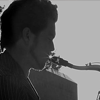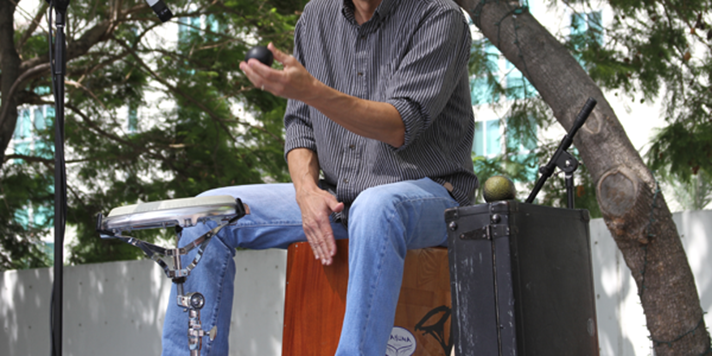This article is a guest post from Sean Winter.
This article is to discuss learning to play what you’ve practiced for the beginning improviser. In the 12 years I’ve played and numerous teachers or clinicians I’ve encountered I always get a different answer to the question “Do you think while you play?” I want to talk about a few different ways to think about this and to try and offer my own perspective as a player.
NO:
This is the one that gets said the most. You should not being thinking about what you are going to play because if you are thinking too much it distracts from your ability to connect to the music and perform with spontaneity. You wouldn’t think about how to spell the words you are speaking so why would you try and deconstruct what you’re about to play before you play it? Furthermore; you should not try and play the things you’ve practiced on the gig. That you should just do practicing in the practice room and when you are at the gig you just play, free and uninhibited by anything.
This answer has always made a great deal of sense to me. Ultimately our goal is the music and creation. Improvisers compose solos on the spot as apart of the interaction with the band in an effort to make the value of the band greater than the sum of its parts.
But then what do you play? What is the point of practicing all your scales and modes and ii-V licks and anything else if you aren’t allowed to use them? We hear the greats of today playing pre-rehearsed patterns all the time. Are we supposed to think that they didn’t intend to play those amazing solos before they played them? I’d be quite shocked if they weren’t thinking about how to approach the song as it was playing before they took their solo.
Many great players have recognizable licks and tricks that make them unique. It would be smart to assume that someone as proficient at saxophone altissimo as Lenny Pickett practiced it to death before going out and performing it.
I think it’s important to realize that when someone tells you that you shouldn’t be thinking while playing it’s meant as more of a conceptual answer. You shouldn’t have to think in order to play well. If you practice something enough you won’t have to think about it in order to play it. You are free to play anything you want and if it’s a ii-V lick you’ve played a million times, that’s O.K.
YES:
You should think about how you’re playing while you’re playing. Have a plan. What are you going to do to make your solo unique? Perhaps you’ll start out ripping and just play a shredding solo all the way through. Your solo could be a slow cooker and build to a long awaited climax. It could just be an extended funky repetition of notes running through the changes of the song. All of these ideas are valid and have a place.
As improvisers it’s basically our job to make solos interesting. The only way to increase our musical vocabulary is to listen and practice. Great soloists are able to play with our minds. They are able to make us feel the emotions they’re conveying through their music. After hours upon hours of dedicated practice they have learned different devices to help aid them in conveying these emotions.
To say that these improvisers don’t or never think while they play is in my opinion not entirely accurate.
The greatest solos are constructed out of a deep knowledge and understanding of the music being played whether it is funk or bebop. In order to accurately play what we hear we need to know what sounds we are trying to play before we play them. If we want to play a diminished substitution over a dominant chord we need to quickly determine which chord it is we are playing over and which diminished scale we are going to use. If we didn’t think about these things and then play them then we would be playing anything at all!
Ultimately we practice in order to cut down the amount of time it takes our brain to transmit the signals to out hands or feet or vocal chords in order to make the music happen. You may not have to think about how to play a major scale but your brain is constantly thinking in order to help you play the things that you’ve practiced. You are thinking all the time whether you know it or not.
I’m a thinker. Sometimes it’s because I don’t know the material. Other times it’s because I’m trying to construct something that requires some foresight on my part. Mostly I do it because I’m always trying to improve on my playing and feel I owe it to my audience to at least think about what I’m doing while I do it.
Having a plan is one of the best tools for soloing in my opinion. That does not mean that you can’t think of ways to play differently and creatively while you are performing. In fact it is your duty as a performer to do so. You should have practiced enough that you make as few mistakes as possible and that you don’t need to think about what you are playing. But in order to progress as players and performers we should constantly by thinking about the music and ways to make our playing more exciting. If that means playing that lick you practiced for hours at home then by all means play it.
Want more advice like this? Check out our popular FREE eBook – Advice for Young Musicians: From Established Music Professionals.
 Written by – Sean Winter, Saxophonist
Written by – Sean Winter, Saxophonist
Sean Winter is a tenor saxophonist from Victoria, British Columbia. He is currently studying to better himself as a musician as well as playing gigs around town with Blues bands, Soul and Reggae bands. He also leads his own Fusion trio called Weapons of Mass Groove. Read his bio.
[template id=”182″]
